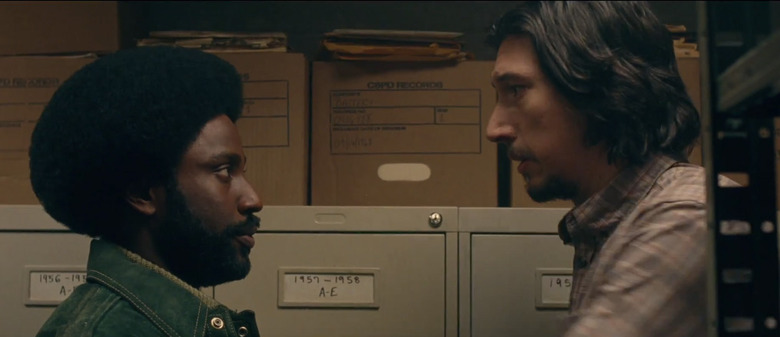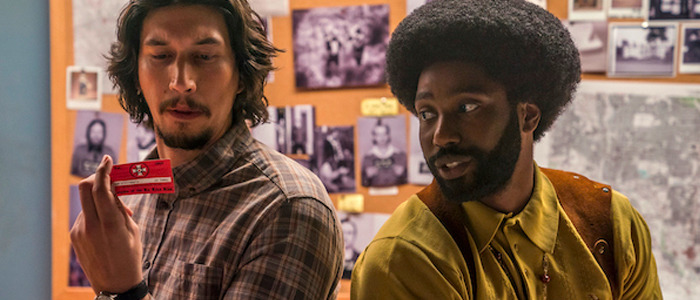With 'BlacKkKlansman,' Spike Lee Has Made A Black Movie For White Audiences – And That's Okay
(Welcome to The Soapbox, the space where we get loud, feisty, political, and opinionated about anything and everything. In this edition: Spike Lee's latest movie is his first to cater directly to white audiences and that's something worth talking about.)
At first glance, BlacKkKlansman checks all of director Spike Lee's typical boxes — it's black, unapologetic, and confrontational. It's distinctly told from the point of view of Ron Stallworth (John David Washington), the first black male police officer-turned-detective in Colorado Springs in the 1970s. That description alone is loaded with conflict, and Lee doesn't shy away from any of it.
But the crux of the film tells an even more poignant story about this real-life hero, who boldly decides to go undercover in the Ku Klux Klan — with the help of his white Jewish colleague (Adam Driver) as his physical proxy while he infiltrates the hate group behind the scenes and through covert phone calls. It's a radical plan and a subsequently radical film that succeeds in illuminating, through a common ground of oppression embodied by these two very different men, the true function of the KKK: absolute power and hatred of everyone who is not a white Protestant man.
But it's the very thing that makes BlacKkKlansman as compelling as much as it is extremely palatable.
Through Other Eyes
For perhaps the very first time in his career, Lee seems particularly interested in bringing mainstream audiences (read: white audiences) in this struggle with Ron, as the director underscores the point that the Klan was not just anti-black and therefore, its existence should be something all people should be actively condemning, not just black people.
This is profoundly stated with Flip (Driver). When Flip agrees to essentially be Ron (because obviously Ron can't exactly blend in with the KKK), and immerses himself in their world of hate, their abhorrence begins to affect him as they regularly spew antisemitic remarks in his presence. So much so that we even begin to sympathize with Flip. Specifically, there's a moment back at the police station when he and Ron are debriefing, and he solemnly talks about his relationship with Judaism. He's Jewish, but doesn't seem to be practicing as an adult. But still, when he hears how the KKK speaks about Jewish people, he feels a visceral pain. It's a rather small, intimate scene and exchange of dialogue that pointedly highlights that Ron's fight is not his alone. It's never really mentioned again, however, though it serves as an unexpected motivation for Flip to take down the KKK. This is no longer just an ambitious and risky job assignment for him. It becomes a personal obligation.
While Flip's "wokeness" might be incidental, Ron's has always been a conscious and daily battle. One of the first questions he's asked by his soon-to-be commanding officer during his job interview is whether he could handle racist remarks by his white colleagues. It is expected that he just shrugs off hatred, that it just comes with the job. But it's not just something that affects him in the professional space. This is something he lives with every day and is the impetus behind why he wanted to lead this case against the KKK. He wants to bring the group down and is intentional about doing it by the hand of the law. It also presents an internal conflict because as a police officer, he becomes the face of the anti-resistance in the black community — a pig.
A Conflict of Interest
Even when Ron goes to Black Panther meetings, it's for his investigation and he interrogates their methods. Should their fight become an all-out war, with weapons? Is there a way to fight white supremacy without actual aggression? We see Ron question this with Patrice (Laura Harrier), who's deeply invested in the organization's message and is offended when she learns he's a detective. How can he be about black power and represent an oppressive, openly anti-black organization?
It's an important question when you consider the pandering tone of BlacKkKlansman as a whole. Unlike the director's other films, including Do the Right Thing and Malcolm X, this newest Spike Lee joint seems to very explicitly placate a wider audience. For the first time, we're seeing the blackness of one of Lee's protagonists questioned. Ron very coyly, and admittedly very smartly at times, appeals to mainstream audiences because he's accessible. For instance, when he's on the phone with David Duke (Topher Grace), the scene simultaneously invites audiences into an easygoing conversation between one of the most known white supremacists in history and a sly black man using a white voice — proving 1) Ron can fight white supremacy using non-violent and oddly comical methods and 2) a black man can blend in with the white crowd and can also befriend its racist leader (even if it is just over the phone).
Meanwhile, at another moment in the film back at the Black Panther meeting, "All Power to All People," is chanted several times — and is effectively juxtaposed with a scene at a KKK meeting shouting "White Power." Though the former slogan was adopted by the Panthers, it seems especially important that its arguably more omnipresent chant "Black Power" is rarely ever heard throughout the movie. It emphasizes Lee's effort to cultivate a range of empathy from a larger audience.
We're All In This Together
It's a consistent intent even until the film's final image. Leading up to the conclusion, Lee reminds audiences of the many recent events that call attention to the fact that white supremacy and hatred is still alive and well in our society. He recalls the video of Eric Garner being held down by police until he took his final breath. We see activists against racial injustice from across cultural backgrounds getting knocked down by cars at the many protests around the country that have occurred just within the last five years. But the last moment is the one that drives the film's ultimate point home: the image of 32-year-old Heather Heyer, a white woman who was killed while protesting the Charlottesville white supremacy rally last year.
Lee could have inserted any number of faces of black victims as the last thought he wanted to leave with audiences. But he very pointedly decides to use the image of a white woman to further illustrate how white supremacy has never been limited to black people, though this is a very specific story about one black man on a very revolutionary endeavor that could affect the lives of many.
It's this micro-to-macro approach that has already succeeded at clenching the support of many audiences and critics across the spectrum, and maybe that makes Lee's latest effort that more interesting to discuss than perhaps any of his previous, more uncompromising work. BlacKkKlansman seems urgent in a whole new way because it galvanizes a wide audience at a time when the United States is once again at a fragile point. But at the same time, its need to satisfy has positioned its otherwise radical filmmaker at a unique point in his storied career. This is not necessarily a bad thing, but it is something worth confronting.


